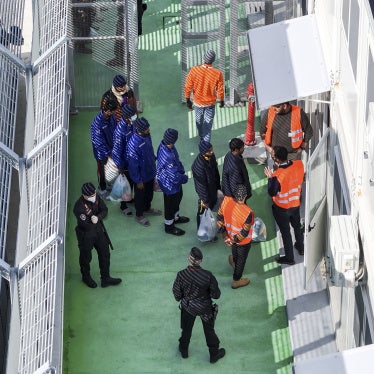More than four and a half years after the war ended in Bosnia and Hercegovina, many ethnic minorities are still unable to repossess their homes in the Bosnian Serb town of Bijeljina.
An estimated 27,000 out of a pre-war population of 30,000 non-Serbs were expelled from Bijeljina during the war. Only a limited number have returned to the town, in part because their houses are occupied by Bosnian Serbs and Serb refugees from elsewhere in the former Yugoslavia. In certain cases, the police, some of whom are themselves occupying Bosniak houses, have actively discouraged returnees by "warning" them that their safety could not be guaranteed, and "advising" them not to return.
In the report, "Unfinished Business: Return of Displaced Persons and Other Human Rights Issues in Bijeljina," Human Rights Watch documents how the Dayton Peace Agreement, which ended the war in Bosnia and Hercegovina, has not succeeded in restoring a multi-ethnic society. Instead, the authorities in Bijeljina continue to obstruct the implementation of the Dayton agreement, providing neither protection nor equal rights to the Bosniak community of Bijeljina, while actively deterring the return of Bosniaks who were driven from the city during the war. For a considerable time after the war ended, government institutions, including the courts and the commission dealing with housing issues, refused to accept requests for the return of Bosniak homes or, having received such requests, took no action on them. In those few cases in which a court or the commission restored Bosniaks' rights to reside in their own homes, the decisions were not implemented.
"It was devastating for those who were expelled from their homes during the war in Bosnia," said Holly Cartner, executive director of the Europe and Central Asia division of Human Rights Watch. "But it is truly unbearable that more than four and a half years after the war ended, they are still unable to go home."
Bijeljina is a strategic city in Republika Srpska (RS), in the divided Bosnia and Hercegovina. It was the first city in Bosnia to come under attack by Serbian and Bosnian Serb forces and fall victim to the policy of "ethnic cleansing." On the night of April 1, 1992, paramilitaries belonging to Arkan's Serbian Volunteer Guard, a.k.a. the "Tigers," together with other paramilitary forces, attacked and occupied Bijeljina. In the four days that followed, many Bosniaks and other minorities lost their lives. Their property was ransacked, looted, and burned, and many Bosniaks decided to leave Bijeljina.
During the war, the Bosnian Serb authorities tried to force the non-Serb population to leave through a rigorous campaign of "ethnic cleansing." Many non-Serbs were fired from their jobs, forced to work at the frontline or held in the Batkovi detention camp. Others were forced to accommodate Bosnian Serb displaced persons in their homes. Those who did not leave Bijeljina "voluntarily" were often forcibly evicted from their homes by armed forces and deported. Ultimately, less than 10 percent of the original non-Serb population managed to stay in Bijeljina.
Since 1999, there have been some improvements in the situation of minorities in Bijeljina. A new property law that facilitates the return of refugees and displaced persons was adopted. Moreover, the international community increased its presence in Bijeljina and improved the cooperation among the international agencies working there. As a result, the speed of return has slowly increased. Nevertheless, ethnic minorities continue to face many difficulties: in addition the numerous obstacles to repossessing their property, the police force still does not offer equal protection to the non-Serb population; discrimination against minorities manifests itself in several fields; and political representatives of minorities are still not allowed to play their role in democratic government. And significantly, what progress has been made has required sustained and intense pressure from the international community.
"Often, the government officials of Bosnia refuse to implement key provisions of the peace agreement, and progress can only be achieved after sustained pressure by the international community," said Ms. Cartner. "Until the government of Bosnia is willing to fulfill its human rights obligations, it has no place in inter-governmental organizations such as the Council of Europe."








